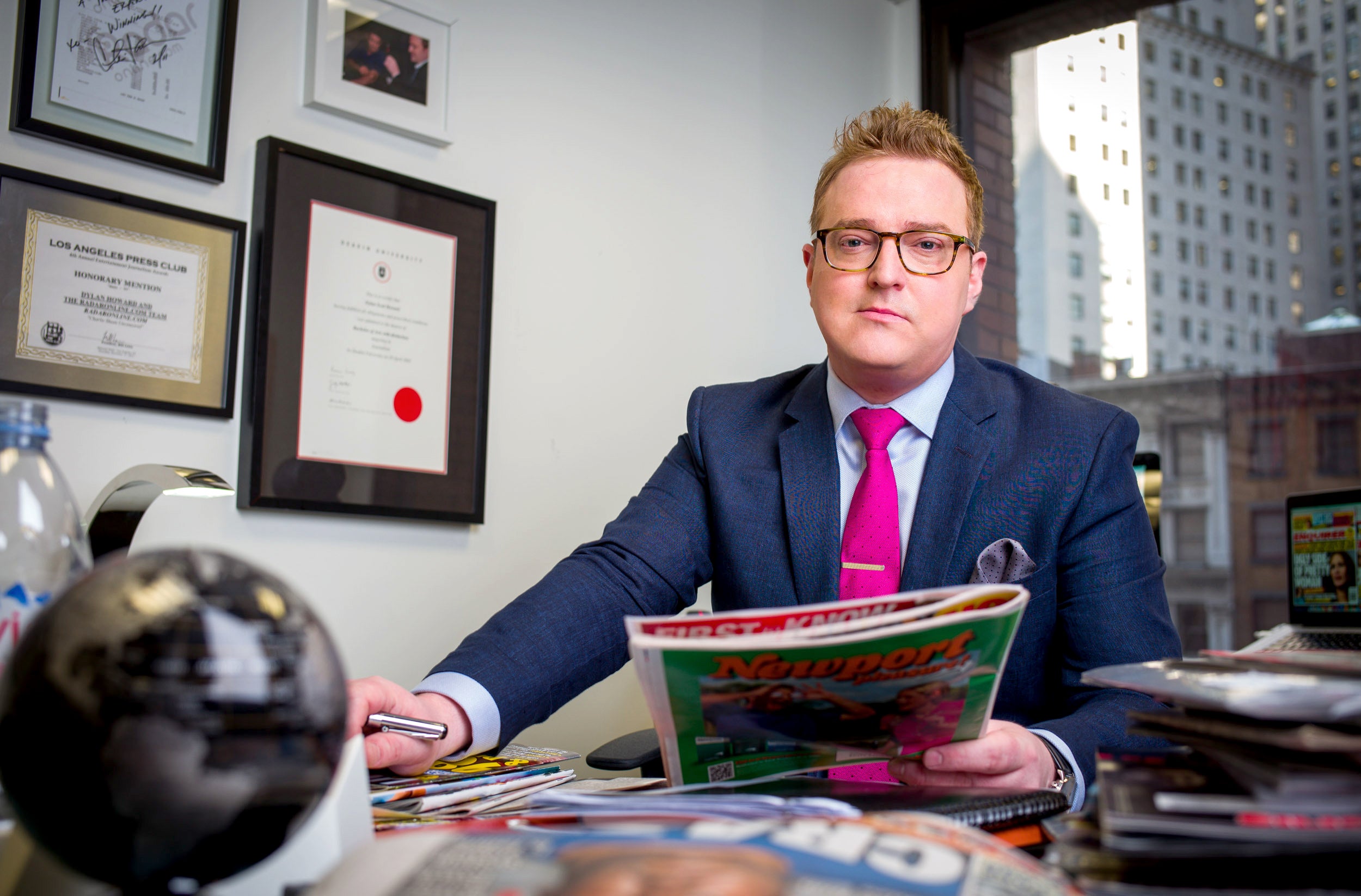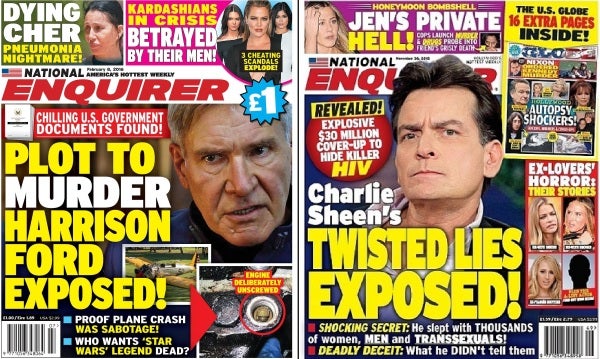
British tabloids have “lost their bite” following the fallout over the phone hacking scandal, according to the National Enquirer’s head of content who claims “salaciousness still sells”.
Chief content officer and editor-in-chief Dylan Howard said the US-based weekly celebrity and entertainment news magazine, published in Britain since 2002, was filling the void left behind by the closure of the News of the World.
The Sunday paper was closed five years ago by owner Rupert Murdoch as the Met began investigations into allegations of illegal phone-hacking.
Seven former staff have since been convicted of conspiracy to intercept voicemail messages, among them editor Andy Coulson.
“I think anyone in our industry would agree that the UK tabloids don’t have the same bite they previously had since the News of the World shutting down and the Leveson Inquiry,” Howard told Press Gazette.
“British journalists and editors are more circumspect about the types of stories they will pursue and the aggressiveness of them.”
With its focus on Hollywood A-listers, the Enquirer can lay claim to several celebrity scoops within the last year, including Charlie Sheen’s HIV positive diagnosis.
(A bone of contention for Howard is that The Sun claimed the story as their exclusive despite running it three weeks after the Enquirer – “The Sun merely lifted it and repackaged it.”)

Howard said the chilling effect of Leveson on UK tabloids coupled with a newsroom culture at the Enquirer boasting “an insatiable appetite to want to break news” that had brought in an “avalanche of scoops” had enabled it to buck the trend of decline seen by its newsstand rivals and boost sales.
The Enquirer UK stopped ABC audits in 2013, but according to its own figures it recorded a 11.7 per cent year-on-year increase in sales from July to December last year and was the only comparative title not to record a fall.
Said Howard: “Celebrity news category in the UK was down 17 per cent, by our reckoning, last year. The only product to present positive year on year growth was the National Enquirer UK.
“We posted a gain in circulation while several other magazines saw losses of 20-30 per cent. In 2016 already we have seen 13 per cent circulation gains over the comparable issues of 2015.”
| Title | July-December 2015 newsstand sales UK and Ireland | Newsstand year-on-year % variance UK and Ireland |
| National Enquirer | 70,442 | 11.7% |
| Closer | 254,668 | -11.7 |
| OK! Magazine | 245,994 | -7.5 |
| New! | 238,910 | -19 |
| Star | 145,032 | -22.6 |
| Heat | 137,683 | -23.1 |
| Now | 120,803 | -21.4 |
| Reveal | 120,402 | -23.7 |
| Look | 97,925 | -27.5 |
Above: Figures from American Media Inc showing sales over six months from July to December 2015 and percentage growth
The UK Enquirer has also seen a leap to 39th in this year’s newsstand ranking report, compiled by WH Smith, up from 80th place in 2012. The report ranks publications based on their retail value, made up from the cover price, sales and frequency.
The Enquirer’s celebrity news rivals Hello, Closer, Take a Break and Heat were in the top ten.
The last ABC figures recorded for the UK Enquirer put its average circulation at 62,834 copies over six months. The latest figures from the company claim an average of 71,806 copies sold over 12 months.
A copy of the National Enquirer costs £1 in the UK, with 17 extended editions a year – including 16 additional pages – selling for £1.59. Print sales are the Enquirer’s main source of revenue as its UK website only serves to promote the print product.
The title is still a long way off its rivals in terms of the sheer number of sales, with market leaders Closer and OK! Magazine selling more than three times as many copies over the same period.
But Howard, who took control of the UK edition of the Enquirer in 2015 and also oversees the US version, praised his team of more than 70 editorial staff based in New York City and Los Angeles (there’s only one UK-based correspondent although Brits make up part of the US team) for bringing in exclusive stories to entice readers.
He said: “We have the best reporting, the best sources in the marketplace. We have a network of informants across the country, and the world, particularly in Hollywood.
“There is no other magazine on British newsstands that covers today’s major Hollywood celebrities and international figures with the energy of the staff on the National Enquirer.
“I think British fans of celebrity have quickly become loyal readers as the daily tabloids and weeklies take a more cautious approach to the stories they report.”
He added: “The proof is underscored by the sales numbers of the UK Enquirer – salaciousness still sells and in my view will continue to sell.
“That is based off the fact we have delivered stories that have dominated both here and abroad and people have picked up the UK Enquirer at the newsstand as a result of that.
“We are delivering to them what others do not.”
Howard said his team, which faced cuts last year (although he refused to reveal how many journalists were culled), used extreme measures to ensure the veracity of sources.
He said: “We naturally are more aggressive than most in our pursuit of the truth.
“We put people through lie detector tests to prove the validity of their information, especially when paying individuals for information – which we have in the past and will continue to do.
“My chequebook is big and it is open.”
Howard, who is also vice president of American Media Inc – the Enquirer’s owners – having worked for the company for eight years, said he considered rival celebrity magazines a “competitor at the newsstand” only.
“I don’t consider them a competitor when it comes to editorial content because they are not pursuing the types of stories that we are – the breaking, hard news, investigative stories,” he said.
He said that the Sun, Daily Mail, Mail on Sunday and the Daily Mirror were the Enquirer’s “chief competitors”.
Declaring himself a “champion of free speech”, he made the call to publish the identities of celebrities hiding behind injunctions in the UK in the Enquirer’s US edition earlier this year.
While the British media had their hands tied after the Sun’s attempt to overturn the injunctions was denied by the Supreme Court, the Enquirer in the US, based outside the court’s jurisdiction, was able to print the details.
“I don’t believe that the media should be gagged from publishing the truth and nor should celebrities be able to use the courts to muzzle news organisations,” said Howard.
“It became apparent to me that we as a news organisation needed to take up the fight on behalf of the media industry as a whole”
He said: “I found it to be a disgrace that millions of people around the world knew the identities of those at the epicentre of these scandals yet in Britain these same celebrities hid behind what I called here in the newsroom ‘the great wall of privacy’ which was supported by judges who appeared to be out of touch with reality in the media landscape of the 21st century.
“The question about the use of injunctions is simple. Should a celebrity who profits from the public consumption of his or her persona be able to silence any narrative that challenges that person?
“To me celebrities derive their income from presenting themselves in a certain light to the public, so therefore their lives and misdeeds are a legitimate manner of public concern.
“In this respect they are no different than the politicians who are still exposed on the front of the British tabloids for their misdeeds.
“So, exposing one’s duplicity as a public figure is the very reason for the existence of a free press.”
While the Enquirer covers true crime, political investigations, health and consumer stories alongside its celebrity coverage, Howard said the focus remained on the “core business”.
“That is celebrity reporting,” he said. “Nothing sells better than a salacious celebrity story.”
Email pged@pressgazette.co.uk to point out mistakes, provide story tips or send in a letter for publication on our "Letters Page" blog
